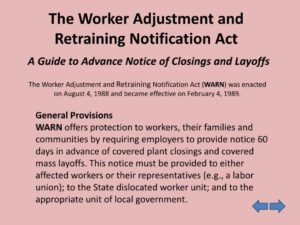In this article, we will cover whether a business can suddenly cease operations whether they are in you are manufacturing plant, trucking carrier or any other type of business.
There have been multiple cases of trucking companies closing operations abruptly and leaving their drivers, vendors and clients in the dust. In this article, we discuss whether it’s legal or not to do so and cease operations without notice and what the implications could be.
The Case Of Arrow Trucking
On December 22nd 2009, just days before Christmas, Tulsa-based flatbed carrier Arrow Trucking announced to its 1700 employees that it’s run out of cash and for all drivers to cease operations. This left many of them stranded on highways and roads without their fuel cards.
A few years later on Dec 1st 2014, James Douglas “Doug” Pielsticker, head of Arrow until December 2009 was indicted. He was charged on 23 counts of various types of fraud and tax evasion — all of which were tied to the mismanagement and schemes.
Doug was arrested in Dallas, TX where he was held for the FBI after being indicted by a grand jury on 23 separate counts which included 1 count of conspiring to commit bank fraud, 15 counts of bank fraud, 1 count of conspiring to defraud the Internal Revenue Service, 3 counts of tax evasion, and 3 counts of failing to account for and pay over payroll taxes.
What They Did Wrong
It’s not easy to manage a growing business, however managing cash-flow is imperative to ensuring smooth operations and profitability. Businesses don’t go bust because of lack of profits, instead they go busy because of lack of proper cash-flow management. In the case of Arrow Trucking, and unbeknownst to most people inside the company, they were operating out of loans, after loans, after loans and their primary lender, Transportation Alliance Bank, eventually refused to give them any more credit which is when they decided to cease operations.
When Arrow Trucking officially filed for bankruptcy in January 2010, they had $8.55 million in assets and $98.97 million in liabilities. Arrow was only able to continue operating for as long as it had because it defrauded their lenders by providing them with false financial documents and cheating on their taxes.
Doug was eventually sentenced to 7.5 years in prison. After hearing his sentence he said “I’m sorry to my family,” Pielsticker said to Judge Gregory Frizzell before his sentencing Friday. “I’m sorry to the court. I’m sorry to the people of Arrow that worked for me.”
The sentence came 14 years after a plane crash killed Pielsticker’s father, Jim, who bought Arrow in 1968 and built it into a trucking giant.

This is the first place to start your search.
Submit your information below to find employers and CDL training schools near you.
The Case Of Falcon Transport
In March 2019, General Motors (GM) announced a manufacturing plant in Lordstown, Ohio was going to close down. This move would put 1700 hourly workers left without employment. Although this move is not the entirety of GM closing or abruptly ceasing operations, many businesses down the supply chain would be effected, and thus the case with Falcon Transport.
A month later, Falcon Transport Co. sent e-mails to drivers on April 27 directing them to stop working and announcing that the company was shuttering all its locations, according to Jayson Calhoun, Falcon Transport’s director of operations.
Falcon Transport was founded in 1903 and had a around 550 employees near the time of layoffs. It’s important to note that on Sept. 29, 2017, Falcon was purchased by CounterPoint Capital Partner. They paid $27 million in cash plus “an additional $33 million in debt-financing” to buy Falcon, according to the Freight Waves trade journal.
What Is The WARN Act? The Worker Adjustment and Retraining Notification Act of 1988
According to the US Department of Labor, The WARN Act protects workers, their families, and communities by requiring employers with 100 or more employees to provide at least 60 calendar days of advance written notice of a plant closing and mass layoff affecting 50 or more employees at a single site of employment. WARN makes certain exceptions to the requirements when layoffs occur due to unforeseeable business circumstances, faltering companies, and natural disasters.
With the WARN Act in place, you cannot abruptly cease operations if they don’t fall under the exceptions and you should be prepared to prove in the event of any lawsuits or legal cases.


